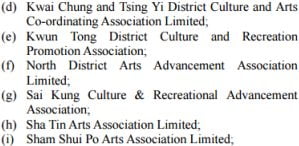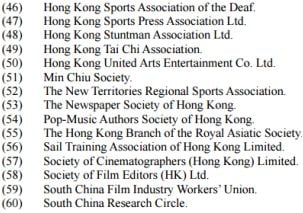The byzantine structure of Hong Kong’s rigged electoral system is a bit of a sideshow these days. There was a time when pro-democracy campaigners fixated on ‘opening up’ small-circle functional constituencies and liberalizing other arcane details of the political structure. But the quasi-democratic reform package proposed in 2014 finally made it clear that such fiddling is irrelevant: the Chinese Communist Party will accommodate elections only if it can decide the results in advance.
That led to the Occupy/Umbrella movement of 2014-15, followed by the Legislative Council’s rejection of the reform package around a year ago (the opposition ironically wielding a veto designed to give Beijing a braking mechanism). With Chinese officials now openly if clumsily increasing their influence in the city’s government, academia and media, the fight to defend Hong Kong’s freedom and values has spread far beyond the largely ornamental political structure.
Pro-democracy lawmakers still hinder the government through filibustering – to mixed effect. But most of the action is now on the streets and campuses and on-line, in the form of localism, anti-smuggler protests, indie cinema and dozens of future movements the authorities will fail miserably to anticipate. Different groups of young activists plan to participate in September’s Legislative Council elections, but with no agreement on why, let alone on tactics.
So it seems odd that a bunch of people should start to make a fuss about being accepted as electors in what the South China Morning Post calls the ‘cultural sector’.
The SCMP reporters – like most people – find it all too confusing and don’t tell us whether the individuals were applying to be voters in the Sports, Performing Arts, Culture and Publishing Functional Constituency or its Culture Sub-Sector. Either way, voters in these two entities must be corporate bodies, not humans. (The Performing Arts Sub-Sector, on the other hand, does allow some humans to vote if they are members of particular organizations.) It’s all here in this pamphlet if you really want to know, but, as we shall see, it doesn’t really matter.
Whatever these guys hope to achieve, they will hopefully help publicize the true role and function of these ‘rotten boroughs’. As we see from the list of functional constituencies’ electors, this is a classic Communist/corporatist technique, in which rights are enjoyed by approved groups, not individuals. Some FCs – like the teachers, lawyers and nurses – comprise individuals each having a vote. But only a few of the 30 FCs are like that. A larger number represent business sectors (like banking, transport, retail, tourism) in which a small group of companies and/or masses of obscure trade associations vote. Other FCs and sub-sectors apparently represent clusters of unconnected, government-subsidized or barely-existent interests, like the Sports-and-Blah-Blah one (long the fiefdom of joke lawmaker Timothy Fok), or Agriculture and Fisheries.
The official purpose of this idiocy is two-fold:
- Voters in FCs elect half the members of the Legislative Council. Since most of these FCs are made up of small groups of CEOs/tycoons or packed with phony United Front ‘organizations’, the system gives Beijing a large bloc, with a veto, that it can use to control the legislature.
- Voters in the sub-sectors elect most of the members of the Election Committee that supposedly elects the Chief Executive (and would have supposedly decided who got onto the ballot had we gone along with the 2014 reform bill). Again, this means Beijing controls a majority of the 1,200 votes – making the whole Chief Executive ‘election’ a complete charade: it simply rubber-stamps Beijing’s pre-determined choice.
If the entertainers applying to be members of the Sports-and-Blah-Blah FC draw attention to this disappointingly little-understood truth, that’s great. Wherever the action is, it’s never going to be the FCs.





Problem is Hong Kong doesn’t have culture, it has entertainment. It doesn’t have fashion, it has a way of dressing. And so on.
As for sport, it’s the only place I know that lets its pupils do table tennis in PE lessons.
It does of course have some special Olympic events:
Wheelin and Dealin
Moanin and Groanin
Pushin and Shovin
As for politics and elections, it’s like trying to herd cats. The local idea of democracy is to ask the biggest person in any group what they should do.
Let’s all have a good laugh before the show ends. Stop analyzing jokes. It kills them.
It’s good to know that the Sha Tau Kok Small Long Liner and Gill Net
Fishermen’s Credit Co-operative Society, Unlimited, have a say in choosing the next CE. However, what about the Sha Tau Kok Big Long Liner and Gill Net
Fishermen’s Credit Co-operative Society, Unlimited? Don’t they have a voice? That’s discrimination in my book.
Ah the dysfunctional constituencies I say, just refuse to accept the Functional Constituencies ballot paper at the table saying: “I don’t want it, as by my understanding, accepting it contravenes Section 14 of the Elections (Corrupt and Illegal Conduct) Ordinance 2012”. It screws badly with their paperwork as a bonus.
And a robber button?